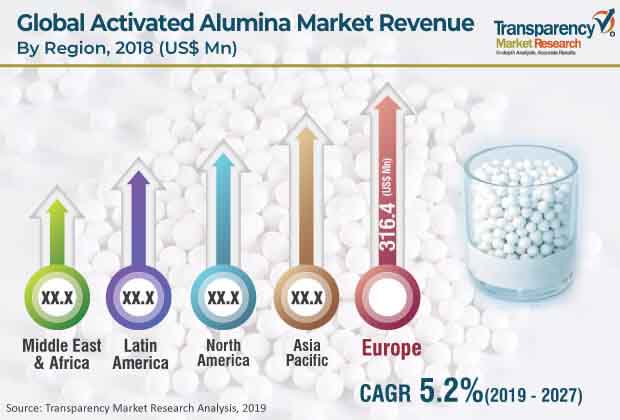
Activated Alumina Market: Overview
The global activated alumina market was valued at more than US$ 900 Mn in 2018. It is anticipated to expand at a CAGR of approximately 5.2% during the forecast period, according to a new report titled ‘Activated Alumina Market: Global Industry Analysis, Size, Share, Growth, Trends, and Forecast, 2019–2027’ published by Transparency Market Research (TMR) . Activated alumina is a highly porous and granular form of aluminum oxide. It is used as desiccant, adsorbent, and catalyst in oil & gas, water treatment, and chemical processing industries. Activated alumina is manufactured by dehydroxylating aluminum hydroxide. Activated alumina has high surface area, thus ensuring excellent adsorption abilities. Asia Pacific and Europe are leading regions of the activated alumina market. The activated alumina market in Asia Pacific is projected to expand at a CAGR of around 6% during the forecast period owing to the high growth in the water treatment infrastructures in the region.

Request For Sample:https://www.transparencymarketresearch.com/sample/sample.php?flag=S&rep_id=3914
Rising Investment in Water Treatment Infrastructure in Developing Economies to Drive Activated Alumina Market
Water scarcity across the globe is one of the major problems that the world is facing. Demand for water is increasing at substantial pace due to the increase in population across the globe. According to a report published by the United Nations 1.8 billion people are expected to be living in geographies with absolute water scarcity by 2050. This estimate supports the fact published by The International Food Policy Research Institute, which estimates a 40% gap between the demand and supply of water across the globe over the next 15 years. Governments across the globe are investing in water treatment infrastructure and technologies fo counter these problems. For example, the Government of China allocates around US$ 110 Bn per year for environment protection and pollution control, which includes waste water treatment. GCC countries invested US$ 100 Bn, during the period from 2011 to 2016 to improve desalination technologies including solar energy, maximization of wastewater treatments, and water recycling. Activated alumina is preferred as a point-of-use or point-of-entry water treatment device. Arsenic, lead, and fluoride are some major contaminants present in the water streams. Activated alumina helps remove these contaminants effectively. Thus, increase in investments in wastewater treatment and water recycling are anticipated to drive the demand for activated alumina in the near future.
Buy Now :https://www.transparencymarketresearch.com/checkout.php?rep_id=3914<ype=S
Beads Segment to Gain Momentum
The report presents a detailed segmentation of the global activated alumina market based on its form and application. In terms of form, the beads segment constituted a major share of the global activated alumina market in 2018. Activated alumina beads offer high surface area to mass ratio and is highly porous, which makes it a highly efficient absorbent in various applications. Activated alumina beads are extensively used in the water treatment applications to remove impurities such as fluoride. They are also used in oil & gas applications to dehydrate compressed air and gases such as liquid petroleum gas (LPG) and compressed natural gas (CNG). The beads segment is anticipated to expand rapidly due to high demand for water treatment infrastructure across the developing economies.
Explore Transparency Market Research’s award-winning coverage of the global Industry:https://www.prnewswire.com/news-releases/extensive-applications-across-oil-and-gas-industry-to-invite-good-growth-prospects-for-polyacrylamide-market-from-2019-to-2027-tmr-301168595.html
Oil & Gas Segment to Retain its Dominance
Based on application, the oil & gas segment is projected to hold a dominant share of the global activated alumina market during the forecast period. The segment is likely to expand at significant growth rate from 2019 to 2027. The gas dehydration segment, which is a sub-segment of the oil & gas segment, is projected to expand at a rapid pace during the forecast period. Activated alumina offers diverse attributes such as high surface area to mass ratio and highly porous structure. These attributes make activated alumina a favorable material for oil & gas dehydration. Demand for activated alumina products in the water treatment industry is expected to rise due to extensive use of the material in water treatment plants.
Asia Pacific Accelerates in the Market
Asia Pacific and Europe were key regions of the activated alumina market in 2018. The market in Asia Pacific is anticipated to expand at a rapid pace owing to cross-border investments and business expansion of companies in high-growth areas, such as India and Southeast Asia. Rise in population, rapid urbanization, and robust economic growth are major macroeconomic drivers of the activated alumina market. Regulatory bodies and major firms across the region are encouraging and promoting water sanitation. China is expected to become a key country of the activated alumina market in the region owing the increase in government investment in the field of environment protection and pollution control, which includes water treatment infrastructure. The activated alumina market in Middle East & Africa is also projected to expand at a robust pace.
About Us :
Transparency Market Research is a global market intelligence company, providing global business information reports and services. Our exclusive blend of quantitative forecasting and trends analysis provides forward-looking insight for thousands of decision makers. Our experienced team of Analysts, Researchers, and Consultants, use proprietary data sources and various tools and techniques to gather, and analyze information.
Our data repository is continuously updated and revised by a team of research experts, so that it always reflects the latest trends and information. With a broad research and analysis capability, Transparency Market Research employs rigorous primary and secondary research techniques in developing distinctive data sets and research material for business reports.





